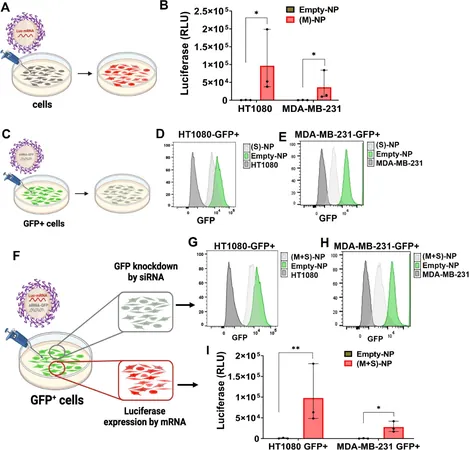
Revolutionary mRNA and RNAi Therapies Could Transform Treatment for Cancer and Cardiovascular Diseases!
2024-12-09
Author: Emma
Breakthrough in Therapy for Complex Diseases
Researchers at the University of Ottawa are on the brink of a major breakthrough, potentially reshaping the landscape of therapy for complex diseases such as cancer and cardiovascular conditions. They have developed a cutting-edge method to deliver both mRNA and RNA interference (RNAi) therapies in a single treatment, which could pave the way for more effective and targeted treatments.
The Potential of mRNA-based Therapies
The success of mRNA vaccines during the COVID-19 pandemic has illuminated the vast potential of mRNA-based therapies, which intricately modulate gene functions. Conversely, RNAi serves as a natural defense mechanism that, while beneficial, can hinder the positive effects of mRNA therapies. The recent proof-of-concept study, published in ACS Nanoscience Au, stands out as it may be the first to demonstrate successful delivery of both mRNA and small interfering RNA (siRNA) in living organisms and cell cultures. This groundbreaking work aims to enhance and regulate multiple gene and protein expressions, thereby improving therapeutic outcomes.
Dr. Suresh Gadde's Insights
Dr. Suresh Gadde, co-lead author and Assistant Professor in the Faculty of Medicine, expressed that their findings could have far-reaching implications for drug development targeting complex diseases. 'For cancer treatments, issues such as mutations in tumor suppressor genes, drug resistance, and tumor recurrence are major hurdles. Our nanoparticle strategies can simultaneously tackle all these challenges,' he stated.
Challenges in Cancer Treatment
Despite the promise of RNA-based strategies, the complexities of cancer necessitate a multifaceted approach. The innovative methods discovered in this study, tested initially on mice, may soon lead to transformative therapies for obstructive diseases by harnessing mRNA delivery, RNA interference, and specific gene silencing techniques.
Potential Applications of the Technology
Dr. Gadde elaborated on the potential applications of their technology: 'Our approach can reactivate tumor suppressor genes like PTEN and P53, which are essential for immunotherapy, while strategically silencing genes linked to drug resistance and cancer stem cell development.'
Looking Ahead: Implications for Research and Treatment
The implications of these findings are immense as they will guide further research into developing nanoparticles that carry both therapeutic mRNA and siRNA. This could open new avenues for clinical applications, elevating the practice of precision medicine for cancer and cardiovascular diseases.
Transforming Patient Care
'In essence, we can selectively enhance or inhibit molecular interactions to optimize treatment results. By promoting factors that inhibit tumor growth while reducing those that facilitate it, we are transforming the therapeutic landscape,' Dr. Gadde concluded, emphasizing the potential of their pioneering work to revolutionize patient care.
Stay Tuned for Future Updates
Stay tuned for more updates on this groundbreaking research as it progresses toward real-world applications!









 Brasil (PT)
Brasil (PT)
 Canada (EN)
Canada (EN)
 Chile (ES)
Chile (ES)
 España (ES)
España (ES)
 France (FR)
France (FR)
 Hong Kong (EN)
Hong Kong (EN)
 Italia (IT)
Italia (IT)
 日本 (JA)
日本 (JA)
 Magyarország (HU)
Magyarország (HU)
 Norge (NO)
Norge (NO)
 Polska (PL)
Polska (PL)
 Schweiz (DE)
Schweiz (DE)
 Singapore (EN)
Singapore (EN)
 Sverige (SV)
Sverige (SV)
 Suomi (FI)
Suomi (FI)
 Türkiye (TR)
Türkiye (TR)